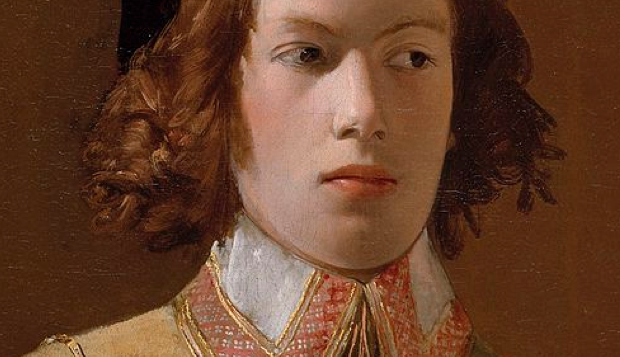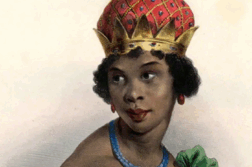THIS YEAR marks the 400th anniversary of the birth of Cyrano de Bergerac, but not the one you have in mind. Edmond Rostand’s hit play of 1897 invented an ultra-Romantic Cyrano, a magniloquent swashbuckler with a promontory of a nose. Hopelessly in love with his cousin Roxane, he sacrifices himself so she may wed the man she loves, ghost-writing his rival’s amorous declarations. This Cyrano—master duelist, improvisatory poet, independent spirit—has entered the popular imagination and spawned scores of imitations.
This character, however, has little to do with the historical Cyrano—least of all the love story. Savinien Cyrano, later de Bergerac, born in Paris in March 1619, was a poet and a swordsman, true, but he was also a sodomite. He belonged to the second generation of libertins, not libertines in the modern sense, but free thinkers. The term comes from the Latin libertinus, an emancipated Roman slave, for these gallants felt free to throw off the trammels of Christianity and conventional morality. In reaction to the Wars of Religion and the Church’s attempt to institute a Counter-Reformation in France, they bragged of their attachments to atheism and sodomy in scurrilous verse.
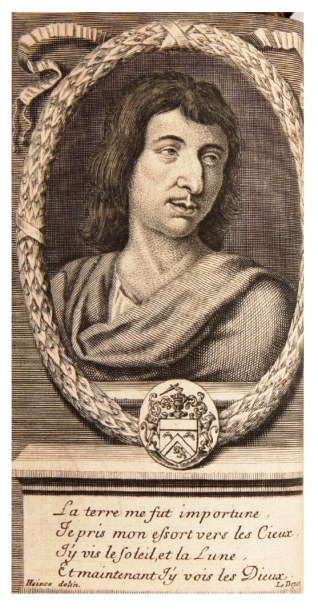
The ringleader of these “forceful minds” (esprits forts) was the gifted poet Théophile de Viau. His blasphemies and boasts of “unnatural” sex shocked the godly, in particular two Jesuits who intrigued to get him banished from Paris. His exile was eased by the companionship of Jacques Des Barreaux, a nineteen-year-old of surpassing beauty and intelligence. They were inseparable, but when they had to be apart, they sent each other passionate love letters in Latin. After a year, Viau was allowed to return to the capital, but the implacable Jesuits employed a rent boy (who shared the bed of one of them) to render daily reports on his activities.
The last straw was Viau’s collection of exceptionally scabrous poems, Le Parnasse satyrique (Satirical Parnassus). In its opening verse, the poet complains of being so eaten up with syphilis that he vows henceforth only to fuck arses. (It was Viau’s recurrent complaint that whenever he gave up sex with boys, he would contract the clap.) He was condemned to be burned at the stake and his ashes scattered to the winds. Since the accused had skipped town, he was burned in effigy; after Viau’s arrest in Picardy and incarceration in an insalubrious dungeon, Des Barreaux renounced him and urged him to repent. (Wilde and Bosie come to mind, especially since Viau wrote a long reply in verse reminiscent of De Profundis.)
After two years’ imprisonment, condemned to lifelong exile and confiscation of his property, Viau reconciled with his younger lover, but, broken by his misfortunes, died shortly thereafter (another Wilde parallel). Des Barreaux, who boldly carried on the libertin tradition and lived into his seventies, became known as “the widow of Théophile.”

Whether nobly born or well connected, these young men of Théophile’s circle were extremely open about their sodomitical tastes. Cyrano was conspicuous for his lack of interest in women. Although some later biographies paint a picture of him wenching in taverns, Cyrano’s soldier friend Le Bret writes in his memoir that “he showed such great restraint towards the fair sex that one may say he never departed from the respect ours owes to it.” Elsewhere he reports: “At that age when nature is most easily corrupted, that great freedom he had to do only whatever he liked brought him to a dangerous weakness (penchant), which I dare say I stopped.” Others refer to Cyrano’s fondness for the city’s “unsightly pimples” (verrues).The phrasing is deliberately vague, but, for the period, highly suggestive.
At seventeen, Cyrano became the lover of Claude-Emmanuel Luillier, alias Chapelle, the bastard son of a finance minister, who was a few years younger. Cyrano lodged with him and dined at his expense. Cyrano also began to associate with Charles Coypeau d’Assoucy. A composer and poet fourteen years older than Cyrano, d’Assoucy was notorious for his taste in young boys, some of whom he taught to play the theorbo (a kind of lute). Despite their difference in age, Cyrano and d’Assoucy had much in common: families from the same region, lawyer fathers, siblings who had gone into the clergy, and atheistic beliefs.
Chapelle had turned seventeen when Cyrano introduced him to d’Assoucy. He was tiring of Chapelle, now that the youth had begun to sprout facial hair. Chapelle invited the musician to dinner, and, the night being late, to share his bed. D’Assoucy became infatuated and tenderly cherished the “lost child.” Nothing was more touching than the start of their friendship, d’Assoucy later recalled: “I could not live without him and it was hard for him to live without me. Any company other than his seemed tiresome to me; and if I am to believe him, he found no conversation more agreeable than mine.”
In 1641, at the advanced age of 22, Cyrano surprisingly enrolled in a rhetoric class at the high school of Lisieux and paid extra to join the school boys, six years younger than he, in the dancing and fencing classes. Evidently, he wanted to be surrounded by the “beautiful adolescents” who populate his fictions. His frequent changes of address also indicate his special tastes, since Parisian parishes were closely watched by the police. Cyrano’s circle of libertins, which eventually included the burlesque poet Scarron and the playwright Molière, broke up by the mid-1650s. Perhaps because his activities had become too compromising, d’Assoucy was assailed in print by his former lovers. Chapelle led the charge:
Ce petit garcon qui vous suit That little boy who follows you
Et qui derrière vous se glisse. And slips behind you.
Que sçait-il? En quelle What does he know? In
exercice, what exercise,
En quelle art l’avez vous What art have you trained him?
instruit?
Il sait tout, dit-il, s’il vous He knows it all, he says,
duit, if he guides you,
Il est bien à vôtre service. He is fully at your service.
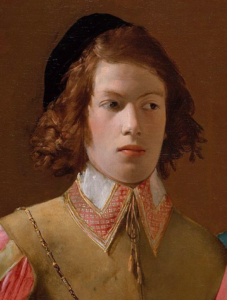
Cyrano’s Satire against Soucidas (an anagram of d’Assoucy), which circulated in manuscript before being published in 1654, mounts an even more scurrilous attack. D’Assoucy is “a billy-goat, an ape, an atheist, a nail in the buttocks of nature … if he had come across God, even the Deity would not have escaped him.” “You who have no place in this world and are nothing but a scab on Nature’s butt; you who will fall so low, if I stop supporting you, that a flea licking the earth will be unable to tell you from the pavement; you, finally, such a filthy bugger [bougre]that, looking at you, one wonders if your mother birthed you through her arse.” No hint here of Rostand and Cyrano’s love letters to Roxane.
In 1656, d’Assoucy was imprisoned for twelve days in Montpellier “for a crime abominated by women,” as Chapelle put it. For the next decade he roamed the roads of southern France and northern Italy with his lute, his verses, and his two “musical pages,” dulcet-voiced pubescents who sang his tunes and whose services he sold on occasion. In his picaresque memoirs, the musician relates many tragic and ribald adventures with his favorite, Pierrotin (Pierre Valentin). He loves him not so much for his voice as for his “caresses” and his “loving kisses.” The Duke of Mantua kidnapped the fourteen-year-old (shades of Rigoletto!), had him castrated in Venice, and turned him into the opera soprano Pietro Valentino.
Like a lovesick stalker, d’Assoucy followed the castrato from city to city, and finally recovered him in 1664. The next three years saw the musician squandering his income on the now dissolute youth. He pardoned him his pilfering, drunkenness, and betrayal, even after he learned from a servant that the ingrate had tried to poison him. In 1667, however, deeply in debt, d’Assoucy had Pierrotin arrested. Four years later, he belatedly published Redoubled Rhymes, a response to Chapelle’s insults, in which he accuses his former bedmate of sodomy and syphilis. In an increasingly decorous age, publication was a misstep which further damaged d’Assoucy’s already equivocal reputation. Molière had asked him to write the music for The Imaginary Invalid, but, as an intimate friend of Chapelle, changed his mind. When the musician was nearly seventy, he was incarcerated for six months by the Holy Office. After his release, he secured a pension from the King and died in 1677.
Unlike the notorious d’Assoucy, whatever love life Cyrano enjoyed “flew beneath the radar.” The few accusations are veiled. It is in his fantasies that Cyrano’s penchants are most evident. Almost all of his writings allude to “masculine loves.” This is most true of his proto-science fiction trip to the moon, The Other World, circulated only in manuscript before 1650. When it was eventually published, its most radical statements and its sequel Trip to the Sun were suppressed. The complete text was made public only in 1921.
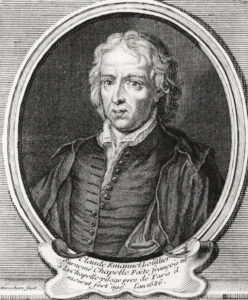
Under the anagrammatic pseudonym Dyrcona, our hero flies to the Moon, which turns out to be a lunar paradise whose natives go about naked. He begins to adore “an adolescent of majestic beauty,” who turns out to be the aged Elijah. At one point our hero is lodged where his host’s son is “a young man who would be a second Socrates, if he could control his intelligence and not smother in vice the graces God continually pours on him.” A demon who tends to him turns into a four-footed man, “whose face was young and handsome”; he “cast his two forefeet round my neck and accused me of ingratitude.” (I quote the 1926 translation of Richard Aldington.) His children, three or four young boys, undress Dyrcona to his shirt. Putting him to bed, the boys tickle his feet, thighs, flanks, and arms “so delicately and nicely that in less than a moment I fell asleep.” The Queen of the Moon wants to wed him as wife to an animal she possesses, who turns out to be a philosophical Spaniard, and everyone asks when they will have young. Dyrcona is sodomized without complaint.
In the Moon, everyone bows before the young “with great courtesy” because old men revere youth. A young man is stronger and more courageous, and thus has the sole right to respect. Cyrano has no interest in family and home, which he disparages through the utterances of Dyrcona’s interlocutors. “What, because your father was so lascivious he could not resist the charms of some baggage, because he made a bargain to satisfy his desire and you were the masonry which resulted from their puddling, you are to revere this sensual fellow as one of the seven wise men of Greece?” In similar terms, he attacks chastity and modesty: “Is there any part of your body more sacred or more profane than another? Why should it be a sin when I touch my center-piece and not when I touch my ear or my heel? Is it because there is a tickling sensation? … I have noticed that far-seeing Nature has made all great, valiant and witty persons lean towards the delicate pleasure of love.”
The Moon men wear scarfs with bronze amulets shaped like male genitalia to distinguish a noble from a commoner. “Mad … to hide a member without which we should be in the category of things that are not, the Prometheus of every animal and the indefatigable repairer of Nature’s weakness! Woe to the country where the marks of generation are ignominious and where those of destruction are honorable!” Adulation of the penis had been a common theme of libertin poetry.
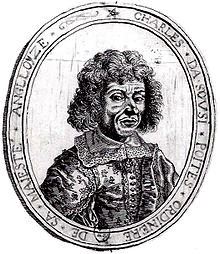
In the long-suppressed sequel, once he has arrived in the Sun, Dyrcona is told tales of eating the fruit of twin trees of love. They originate in the famous friendship of Orestes and Pylades. His informant would expatiate on “all the joys of a gentle passion … with which these lovers have astonished their age, did I not fear so much light would dazzle the eyes of your reason.” When Orestes found Pylades among the dead, kissing his mouth, “he seemed as if he would throw his soul into his friend’s body.” From their bones grew two saplings which intertwined; when the apples of one of the trees is eaten by one man and the fruit of the other by another man, this causes a reciprocal friendship. He who eats more of the fruit is the more beloved. Then Dyrcona’s informant reels off the names of “more than human friendships” in classical mythology: Hercules and Theseus, Achilles and Patroclus, Nisus and Euryalus, Iphis and Ianthë, Salmacis and Hermaphrodite.
This taboo-breaking Cyrano might have been entirely overshadowed in the theater by Rostand’s creation but for a recent exception. In 2014, the controversial playwright Jean-Marie Besset staged Le Banquet d’Auteuil, which Le Monde called “an elegant provocation.” In this discursive drama, Molière, fed up with his wife’s infidelities, holes up in a house in the village of Auteuil to live with his seventeen-year-old protégé Michel Baron and his bosom friend Chapelle. (Historians have long conjectured a sexual bond between Molière and Baron.) The guests at a dinner party are all admitted libertins: the composer Lully and his catamite the dancer Osmane, d’Assoucy and his Pierrotin, and two courtiers. Cyrano shows up as a ghost who tries to seduce the guests to suicide so they join him in the afterlife. The discussions of love and friendship, punctuated by full nudity of three of the boys as they portray the three graces, is reminiscent of the Marquis de Sade’s amalgam of philosophy and sex, minus the sadism.
What is striking about the historic Cyrano’s praise of same-sex love is that at no time in his work does he impute to it guilt or sin or criminality. His libertinism is authentic in rejecting Judeo-Christian morality and the social strictures of his society and in proclaiming the freedom to follow one’s bent. Although it is unlikely that the sodomitical Cyrano will ever replace Rostand’s fanfaron in the popular imagination, the gay pride movement might well claim him as a worthy forefather.
Laurence Senelick is Fletcher Professor of Drama at Tufts University and author of The Changing Room: Sex, Drag and Theatre.

